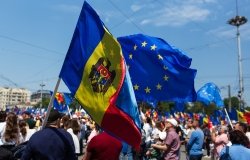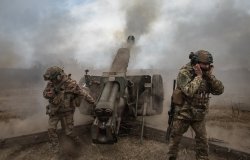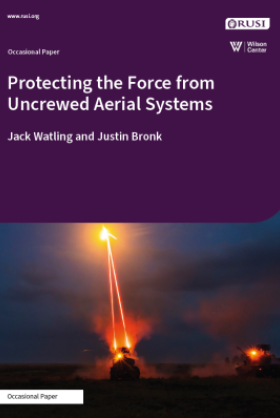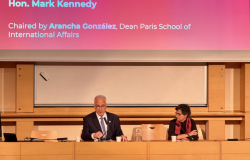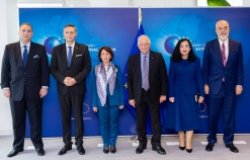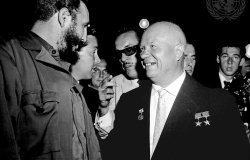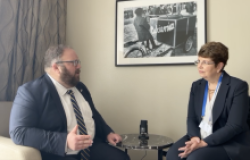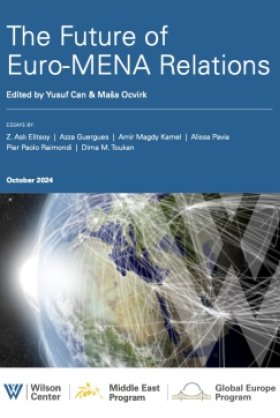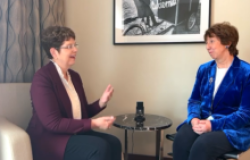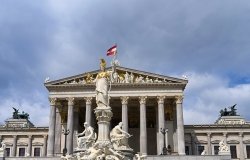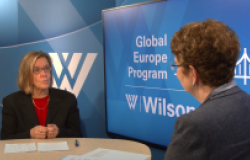192. Bulgaria in the Post-Kosovo Era
Bulgaria once existed as a totalitarian state and a faithful Soviet ally with a centralized socialist economy. Today, it is a functioning pluralist democracy which embraces the liberal views of the West and strives for integration into the prosperous global civilization of the 21st century. The transition has been long and painful, but one that should be examined and recognized for its accomplishments, particularly those within the past year.
Domestically, liberal reforms have paved the way for a victory of pro-democratic forces. In the late 1990s, Bulgaria held nine democratic elections: three local elections, four general elections and two presidential elections. By the end of 1999, Bulgaria succeeded in becoming a stable, pro-democratic, pro-Western nation with a market-economy-minded majority in a Parliament actively seeking to institutionalize liberal reforms.
Two major political events which occurred in 1999 reaffirmed Bulgaria's commitment to democratic advancement: the fall local elections and Prime Minister Ivan Kostov's reshuffling of the cabinet in December. The elections were a significant indicator of the political mood in the country - a victory for the ruling party, but by a much closer margin than expected. Painful economic reforms, rising unemployment levels, corruption issues and some internal tensions within the United Democratic Forces (UDF) coalition help to explain the small margin of victory but also reflect the Bulgarian people's support for a democratic, reform-minded ruling party.
The results of the elections played a significant role in Kostov's decision to make major changes in his cabinet. He dismissed all of the deputy prime ministers and replaced them with only one, he merged and restructured the Economic Ministries, and he introduced new faces into the mix. Kostov's newly created cabinet vowed to speed up the process of privatization, fight corruption, and harmonize Bulgarian legislation with that of the European Union. These changes, though partially politically motivated, helped give Bulgaria a fresh start for the forthcoming EU accession talks.
The economy is in a very fragile state. The political system still has some built-in structural imbalances and potential for political crises and extremes, and Bulgarian society in general is still at a crossroads, searching for better personal and collective solutions to pressing problems. Yet, despite these difficulties, Bulgaria does have a pluralist democracy and is following a path much closer to Central and Western Europe than neighboring Yugoslavia and most of the former Soviet republics.
In the international realm, the single most important event of 1999 for Bulgaria was the Kosovo war. NATO's decision to bomb Yugoslavia over Kosovo caused conflicts between Bulgarian politicians wishing to appear cooperative with the West's key military and security organizations and a public hostile to any involvement. The tenuous situation was exacerbated by economic hardships resulting from the war and NATO's embargo of Yugoslavia, a break in communication, and errant NATO missiles landing on Bulgarian soil. Throughout, top NATO officials were asking Bulgaria for logistical support and access to Bulgarian air space.
Kostov's government adeptly handled the situation by utilizing all resources available to influence public opinion to support NATO's policies in Kosovo. By presenting cooperation with NATO as a way to address Bulgaria's key security concerns in the crisis without any direct involvement in the Macedonian dimension of the problem, including the issue of refugees, Kostov was able to sway public opinion in favor of compliance with NATO. Internal tensions stemming from opposition to the NATO air war subsided and the agreement with NATO eventually provided additional national security guarantees for Bulgaria in the form of provisions to protect it from retaliatory external attacks.
Bulgaria's agreement to grant NATO's requests signifies a change in Bulgarian attitude and highlights several common trends during the 1990s. Specifically, it reflects Bulgaria's changing perceptions of East and West, Russia and the United States, and the European Union and the Balkans. Bulgaria is now seeking to present itself as a factor of stability in the Balkans and its cooperation with NATO is just one example of the strides it has made in this area.
Bulgaria's new foreign policy stance and the choices made by its government with respect to the Kosovo campaign also paved the way for two other important events - President Clinton's visit in November and the EU's decision at the Helsinki summit to extend invitations to Bulgaria and five other countries to begin a "second wave" of EU accession talks. The visit to Sofia by President Clinton was a very positive and important step for Bulgaria. Significantly this was the first such visit of an American president to Bulgaria. This historic visit, like Bulgaria's invitation to participate in the Stability Pact for Southeastern Europe, recognized a partnership between Bulgaria and the Western alliance and acknowledged a joint desire for the resolution of the conflicts and problems plaguing this region.
Both internationally and domestically, Bulgaria has made significant progress in the last ten years. Through its successes of the past decade, Bulgaria has acquired a new confidence in its foreign policy stance and become an active participant in the region's conflict resolution efforts. It enters the 21st century as a stable, democratic nation and should be commended for its progress thus far.
Kostadin Grozev spoke at an EES Noon Discussion on January 19, 2000
About the Author
Kostadin Grozev
Read More
Global Europe Program
The Global Europe Program is focused on Europe’s capabilities, and how it engages on critical global issues. We investigate European approaches to critical global issues. We examine Europe’s relations with Russia and Eurasia, China and the Indo-Pacific, the Middle East and Africa. Our initiatives include “Ukraine in Europe” – an examination of what it will take to make Ukraine’s European future a reality. But we also examine the role of NATO, the European Union and the OSCE, Europe’s energy security, transatlantic trade disputes, and challenges to democracy. The Global Europe Program’s staff, scholars-in-residence, and Global Fellows participate in seminars, policy study groups, and international conferences to provide analytical recommendations to policy makers and the media. Read more
